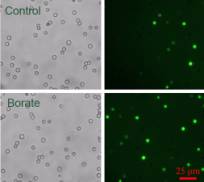Prof. Tian's lab studied the mechanism by which borate stresses the  pathogenicity of P. expansum by a proteomics approach. They found that two antioxidant proteins (CAT and GST) in intracelluler P. expansum are repressed by borate, which results in increased reactive oxygen species (ROS) levels and damaged proteins in cell. This result indicates that the two antioxidant proteins are important in scavenging ROS and are critical for the virulence of P. expansum . The expression of PG gene in the extracellular P. expansum is repressed by borate , which shows that hydrolytic enzymes also play a crucial role in pathogenicity of fungal pathogen (Molecular & Cellular Proteomics, 2007).
pathogenicity of P. expansum by a proteomics approach. They found that two antioxidant proteins (CAT and GST) in intracelluler P. expansum are repressed by borate, which results in increased reactive oxygen species (ROS) levels and damaged proteins in cell. This result indicates that the two antioxidant proteins are important in scavenging ROS and are critical for the virulence of P. expansum . The expression of PG gene in the extracellular P. expansum is repressed by borate , which shows that hydrolytic enzymes also play a crucial role in pathogenicity of fungal pathogen (Molecular & Cellular Proteomics, 2007).
Figure. Effect of borate on the production of reactive oxygen species in spores of Penicillium expansum . Spores were cultured at 25°C in potato dextrose broth medium supplemented with 0% and 0.1% potassium tetraborate. Spores were stained with the oxidant-sensitive probe 2',7'-dichlorodihydrofluorescein diacetate (DCHF-DA) and observed with a fluorescence microscope.
